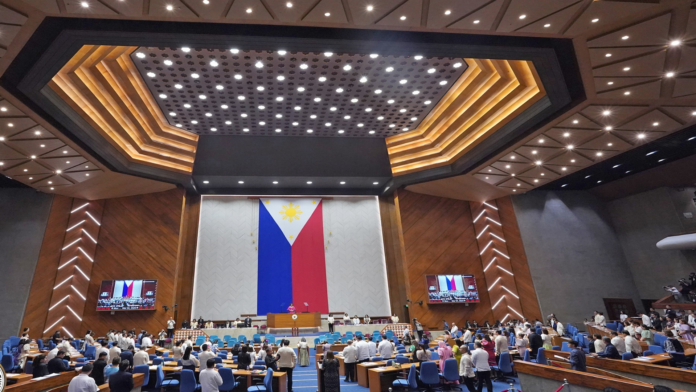The House of Representatives on Monday approved on the third and final reading three bills, including a measure that would make the country’s tax incentives regime more responsive to the changing global landscape.
With 238 affirmative votes, 4 negative votes, and 2 abstentions, the chamber passed House Bill (HB) 9794, otherwise known as the Corporate Recovery and Tax Incentives for Enterprises to Maximize Opportunities for Reinvigorating the Economy Act (CREATE MORE) bill.
The bill proposes that the income tax rates will be 20 percent for domestic and resident foreign corporations be under the enhanced deductions (ED) regime.
House Ways and Means Committee chair Joey Salceda said the CREATE MORE bill would make the country’s tax regime both compliant with the minimum global tax and competitive.
“The international landscape on taxation is rapidly changing, with the imposition of global minimum tax, the shift of manufacturing away from China, and the global consensus towards cost-based tax incentives. CREATE MORE is our response to these developments. And it pragmatically affirms what works with the CREATE law, while correcting other policies early,” he said after the approval.
He said the income tax holiday (ITH) and special corporate income tax (SCIT) regime of 0 and 5 percent under the CREATE law no longer meet the standards set by the Organization for Economic Cooperation and Development (OECD).
Salceda added that even if multinational companies avail of the country’s “attractive incentives”, they will still be required to pay a top-up tax in their countries of origin with the implementation of the global minimum tax rate of 15 percent.
He said the conflicting interpretations of the value-added tax (VAT) regime under the implementing rules and regulations (IRR) of the CREATE law must be resolved, especially given the loss of around 125,560 manufacturing jobs.
The bill would make the value-added tax (VAT) regime simpler, clearer, and transaction-based, while also improving its refund process.
He said the bill reverts the power to grant incentives to the Investment Promotion Agencies (IPAs), but the policymaking and oversight functions of the Fiscal Incentives Review Board (FIRB) are retained.
Academic recovery program
The House also voted 240-0-0 to approve HB 8210, or the proposed Academic Recovery and Accessible Learning (ARAL) Program Act.
House Committee on Basic Education and Culture chair and Pasig City Rep. Roman Romulo, author of the bill, said the ARAL Program aims to address the gap between the current and the expected learning competencies among learners.
“This program shall strive to ensure that the learners attain the most essential learning competencies covering the subjects of reading, mathematics, and sciences through the tutors who shall conduct the lessons in the program,” Romulo said.
The proposed program shall cover the most essential learning competencies (MELCs) under Language and Mathematics for Grades 1 to 10, and Science for Grades 3 to 10.
The proposed ARAL program shall cover public school learners who failed in the examinations and tests assessed and evaluated by the teachers; received grades that are marginally above the minimum level of mastery required in the attainment of the MELCs; and returned or are returning after a furlough.
The program would hire tutors from any of the following: 1) students of teacher education institutions, 2) government internship program of the DOLE, 3) students in higher and technical-vocational educational institutions taking up the National Training Services under the National Service Training Program, 4) volunteers from non-government organizations or civil society organizations, and 5) individual volunteers.
Meanwhile, teachers and para-teachers participating as tutors under the program shall be compensated for their services.
Tutorial sessions can be held after school hours, on weekends, during the school year except on the day of worship following the beliefs or religion of the learner, or during semestral breaks.
The tutorial sessions shall be delivered either through face-to-face tutorials, online tutorials, and blended learning.
Tutors will be provided with the appropriate training and seminars, focusing on innovative instructional techniques, interpersonal skills, social-emotional learning, and cultural competency before they participate in the ARAL program.
Early childhood care
The chamber also overwhelmingly approved on final reading HB 10142, or the proposed Early Childhood Care and Development (ECCD) System Act, with 242 affirmative votes.
The bill aims to eliminate infant and child death rates by ensuring that adequate health and nutrition programs are accessible to young children and their parents.
It also aims to facilitate a smooth transition from home to classroom setting and ensure that young children are adequately prepared for the formal learning system that begins at kindergarten.
The ECCD system shall have the following components: a) ECCD curriculum focused on the child’s holistic development; b) parent education and involvement; c) integrated nutrition and health program; d) human resource development program; e) management, monitoring , and evaluation; and the f) child-find system for the early identification, screening, monitoring and evaluation of children below 5 years of age in relation to the delivery of ECCD programs and services.
The ECCD system shall apply to all provinces, cities, municipalities, and barangays to achieve universal ECCD coverage for all children below 5 years of age. (PNA)
Photo credit: Facebook/HouseofRepsPH


